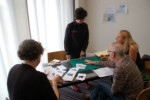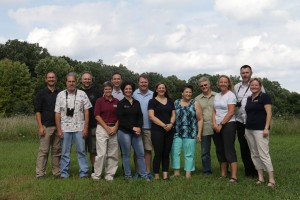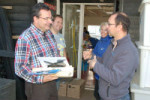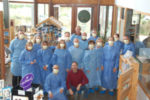Putting international collaboration to the test

Phase two of the Global Oiled Wildlife Response System (GOWRS) project recently kicked off in Belgium providing another two years in which to further the objective of developing and improving international cooperation and preparedness for oiled wildlife incidents.
EP Arctic Report: Oiled wildlife response plans should be developed
EUROWA project comes to a close (for now)
Creating targeted training for responders, governments and industry
A new self-assessment tool for oiled wildlife response preparedness

How prepared are we for oiled wildlife response?
This is a question regularly considered by the HELCOM Response (Baltic Sea Area) Expert Working Group on Oiled Wildlife Response (EWR-OWR), chaired by Sea Alarm.
To help with making an accurate assessment of their level of preparedness, the Working Group decided to develop a self-assessment tool to aid countries in gauging and reporting on their progress toward preparedness for response to oiled wildlife.
Paving the way for international oiled wildlife response assistance

The third meeting of experts involved in the Global Oiled Wildlife Response System (GOWRS) project took place last month in Delaware, USA.
The project– a two-year initiative funded by the International Association of Oil and Gas Producers (IOGP) as part of the Oil Spill Response Joint Industry Project (OSR-JIP) – aims to design an international system for oiled wildlife response expertise that can be mobilized for assistance in complex oiled wildlife scenarios.
A heartfelt thank-you from Brussels
The Sea Alarm team were shocked and saddened by recent events in Brussels. Our thoughts are very much with the victims, their families and friends. We and our families were lucky – we are all safe, but we have been…
Second meeting of global wildlife response project takes place in Brazil

The second in-person meeting of ‘JIP20’, an oil-industry-funded project to develop a system for mobilising international oiled wildlife response resources, was held in Brazil in February. Aiuká, one of the participating organisations, hosted the meeting at their oiled wildlife response facility in Praia Grande, near Santos.
Texel field exercise tests NL wildlife response strategy

In December 2015, a field exercise at ECOMARE, on the Wadden Sea island of Texel, tested local oiled wildlife response capability and ECOMARE’s ability to function as a stabilisation centre. Sea Alarm and Wildlife Rescue Centre Ostend organised the exercise as part of the Dutch national oiled wildlife training and exercise programme.






